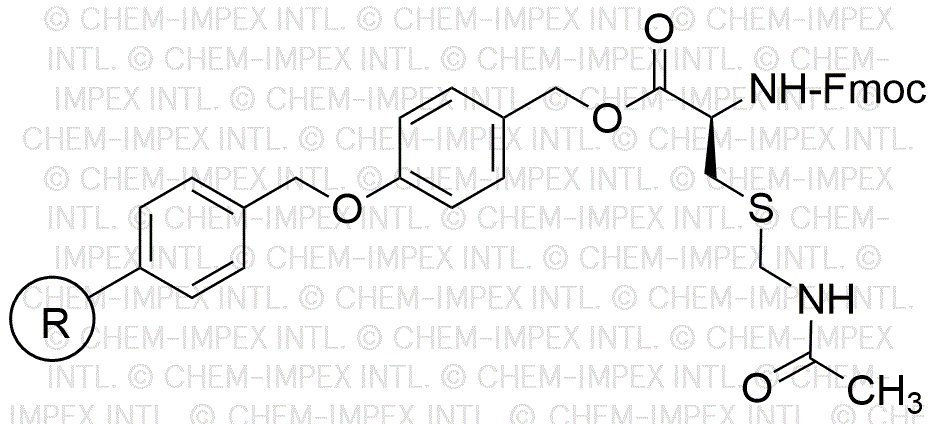Fmoc-S-acetamidomethyl-L-cysteine 4-alkoxybenzyl alcohol resin is widely utilized in research focused on:
- Peptide Synthesis: This resin is primarily used in solid-phase peptide synthesis, allowing researchers to efficiently create complex peptides for various applications in drug development and biotechnology.
- Bioconjugation: The resin facilitates the attachment of peptides to other biomolecules, enhancing the development of targeted therapies and diagnostic tools in the pharmaceutical industry.
- Custom Drug Development: Its unique properties enable the design of customized drug candidates, particularly in cancer research, where specific targeting of tumor cells is crucial.
- Protein Engineering: Researchers leverage this resin in the modification of proteins, which can lead to improved stability and functionality, essential for therapeutic applications.
- Analytical Chemistry: It is also used in the preparation of samples for mass spectrometry, aiding in the identification and quantification of biomolecules in various research fields.
General Information
Properties
Safety and Regulations
Applications
Fmoc-S-acetamidomethyl-L-cysteine 4-alkoxybenzyl alcohol resin is widely utilized in research focused on:
- Peptide Synthesis: This resin is primarily used in solid-phase peptide synthesis, allowing researchers to efficiently create complex peptides for various applications in drug development and biotechnology.
- Bioconjugation: The resin facilitates the attachment of peptides to other biomolecules, enhancing the development of targeted therapies and diagnostic tools in the pharmaceutical industry.
- Custom Drug Development: Its unique properties enable the design of customized drug candidates, particularly in cancer research, where specific targeting of tumor cells is crucial.
- Protein Engineering: Researchers leverage this resin in the modification of proteins, which can lead to improved stability and functionality, essential for therapeutic applications.
- Analytical Chemistry: It is also used in the preparation of samples for mass spectrometry, aiding in the identification and quantification of biomolecules in various research fields.
Documents
Safety Data Sheets (SDS)
The SDS provides comprehensive safety information on handling, storage, and disposal of the product.
Product Specification (PS)
The PS provides a comprehensive breakdown of the product’s properties, including chemical composition, physical state, purity, and storage requirements. It also details acceptable quality ranges and the product's intended applications.
Certificates of Analysis (COA)
Search for Certificates of Analysis (COA) by entering the products Lot Number. Lot and Batch Numbers can be found on a product’s label following the words ‘Lot’ or ‘Batch’.
*Catalog Number
*Lot Number
Certificates Of Origin (COO)
This COO confirms the country where the product was manufactured, and also details the materials and components used in it and whether it is derived from natural, synthetic, or other specific sources. This certificate may be required for customs, trade, and regulatory compliance.
*Catalog Number
*Lot Number
Safety Data Sheets (SDS)
The SDS provides comprehensive safety information on handling, storage, and disposal of the product.
DownloadProduct Specification (PS)
The PS provides a comprehensive breakdown of the product’s properties, including chemical composition, physical state, purity, and storage requirements. It also details acceptable quality ranges and the product's intended applications.
DownloadCertificates of Analysis (COA)
Search for Certificates of Analysis (COA) by entering the products Lot Number. Lot and Batch Numbers can be found on a product’s label following the words ‘Lot’ or ‘Batch’.
*Catalog Number
*Lot Number
Certificates Of Origin (COO)
This COO confirms the country where the product was manufactured, and also details the materials and components used in it and whether it is derived from natural, synthetic, or other specific sources. This certificate may be required for customs, trade, and regulatory compliance.


